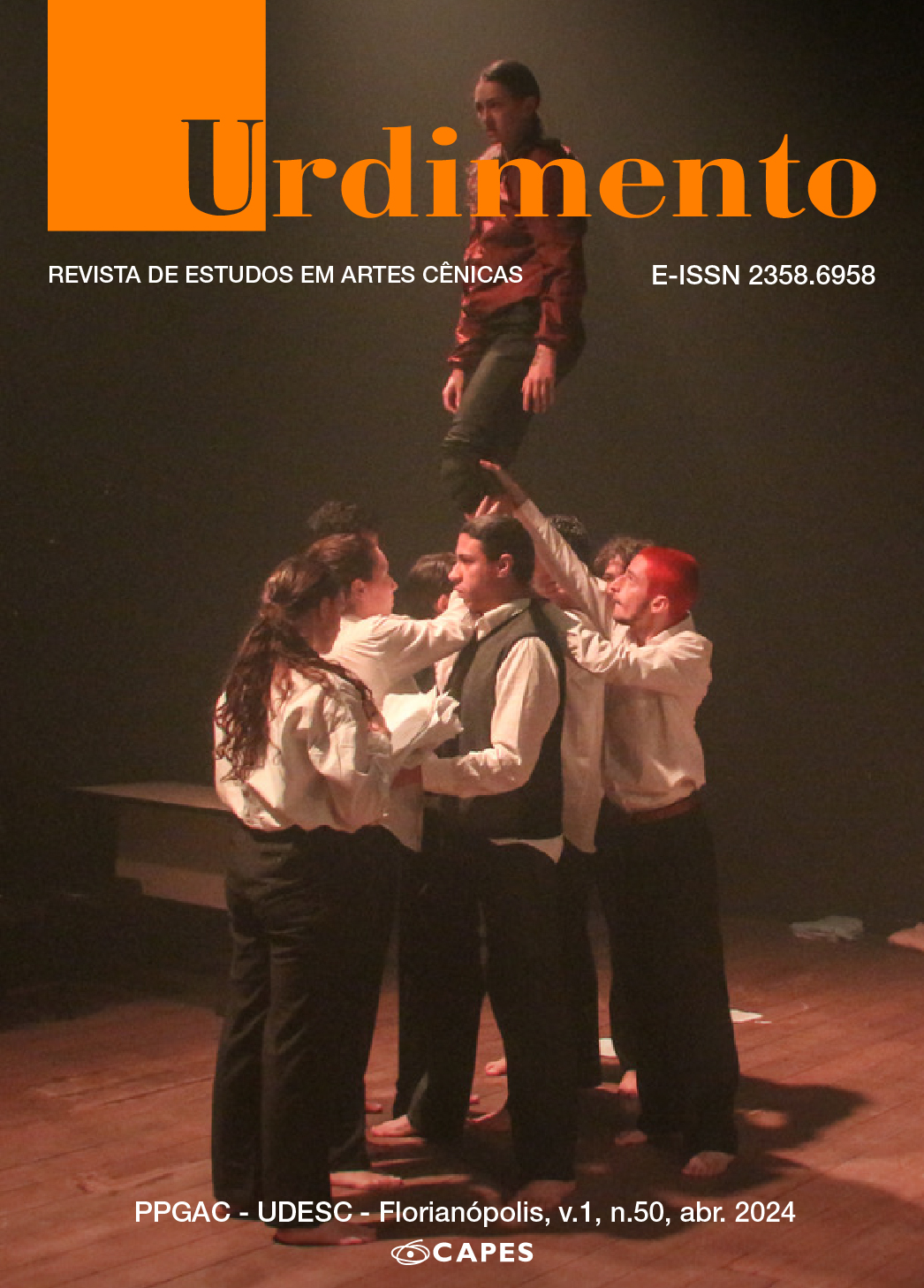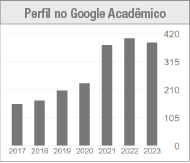From catharsis to the cathartic: toward a post-dramatic theory of representation
DOI:
https://doi.org/10.5965/1414573101502024e0701Keywords:
catharsis, cathartic, voice, gaze, desireAbstract
The understanding of the notion of catharsis has been through constant theoretical debates and controversies throughout history of theater. Different perspectives were born entangled to varied social, cultural, and political contexts. The notion of catharsis related to classical tragedy, as defined by Aristotle, has since been explored by theater movements until its apparent refusal in contemporary theater, especially in the so-called post dramatic theater. This article does not aim to explore yet a new understanding of catharsis in the contemporary. Instead, it examines how experiments in post dramatic theater distance themselves from the Aristotelian notion and establish a new perspective focused on the cathartic effect, an analysis that traverses the Lacanian psychoanalysis.
Downloads
References
Referencias da Tradução
ARISTÓTELES. Poética. Trad. Ana Maria Valente, Lisboa: Edição da Fundação Calouste Gulbenkian, 2008.
ARISTÓTELES. Política. Trad. António Campelo Amaral e Carlos Gomes, Lisboa: Veja, 1998.
LACAN, J. O seminário, livro 7 – a ética da psicanálise. Texto estabelecido por Jacques-Alain Miller, versão brasileira de Antonio Quinet. Rio de Janeiro: Jorge Zahar Editor, 1988.
MATTOS R., VIVES J.-M. “From catharsis to the cathartic: toward a post-dramatic theory of representation”. Edição: Sukhanova, Ekaterina and Hans-Otto Thomashoff. Body Image and Identity: Psychoanalytic, Social, Cultural and Aesthetic Perspectives. Nova York, Routledge: 2015, p. 86-94.
MATTOS, R; VIVES, J.-M. From catharsis to the cathartic: toward a post-dramatic theory of representation. ResearchGate, 2015. Disponível em: https://www.researchgate.net/publication/286224196_From_catharsis_to_the_cathartic_Toward_a_postdramatic_theory_of_representation. Acesso em: 01 de outubro de 2023.
Referencia Original
ARISTÓTELES. La Poétique. Tradução e notas: Roselyne Dupont-Roc, Jean Lallot, Paris: Seuil, 1980.
ARISTÓTELES. Politique. Chapitre 7, 1342a 7-11.
AULAGNIER, P. La violence de l’interprétation. Paris: P.U.F, 1975.
CORNEILLE, P. “Discours de la tragédie et des moyens de la traiter selon le vraisemblable ou le nécessaire”, “Trois Discours sur le Poème dramatique”, Œuvres Complètes. Tome III, Paris: NRF, Bibliothèque de La Pléiade, 1987.
DIDI-HUBERMAN, G. Invention de l’hystérie. Charcot et l’iconographie photographique de la Salpetrière. Paris: Macula, 1982.
FLORENCE, J. “Poétique théâtrale et esthétique freudienne”, Insistance. Toulouse: Eres, 2006.
BANU, G. ; BRUNO, B. (org.). Le cas Avignon 2005. Regards critiques. Paris: L’entretemps, 2005.
FREUD, S. “Personnages psychopathiques à la scène”, Œuvres Complètes. Paris: P.U.F., 2006.
LACAN, J. Le Séminaire, Livre VII, L’Ethique de la psychanalyse. Paris: Seuil, 1986.
LEHMANN, H.-T. Le théâtre post dramatique. Paris: L’arche, 2002.
MATTOS R., VIVES J.-M. “From catharsis to the cathartic: toward a post-dramatic theory of representation”. Edição: Sukhanova Ekaterina; Hans-Otto Thomashoff. Body Image and Identity in Contemporary Societies: Psychoanalytic, Social, Cultural and Aesthetic Perspectives. Nova York, Routledge: 2015, p. 86-94.
NAUGRETTE, C. “Du cathartique dans le théâtre contemporain”, Littérature et thérapeutique des passions. La catharsis en question. Paris: Hermann, 2011, p. 167-180.
PIERRON, A. Les nuits banches du Grand-Guignol. Paris: Seuil, 2002.
REGNAULT, F. “Katharsis” em Conférences d’esthétique lacanienne. Paris: Seuil, 1997.
REGNAULT, F. “La catharsis selon Lacan” em Littérature et thérapeutique des passions. La catharsis en question. Paris: Hermann, 2011.
Published
How to Cite
Issue
Section
License
Copyright (c) 2024 Urdimento: Revista de Estudos em Artes Cênicas

This work is licensed under a Creative Commons Attribution 4.0 International License.
Copyright Statement
The articles published by the magazine are free to use. The copyright is all assigned to the magazine. The articles whose authors are identified represent the expression from the point of view of their authors and not the official position of the journal Urdimento. The author (s) undertakes whenever publishing material relating to the article published in Revista Urdimento mention the said publication as follows: This article was originally published by Urdimento magazine in its volume (put the volume), number (put the number) in the year of (put the year) and can be accessed at:
http://www.revistas.udesc.br/index.php/urdimento
This work is licensed under a Creative Commons Attribution 4.0 International License.




